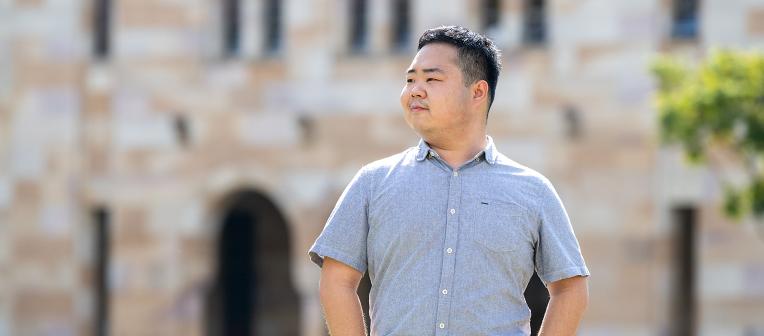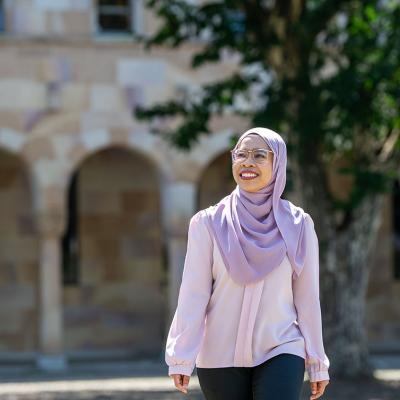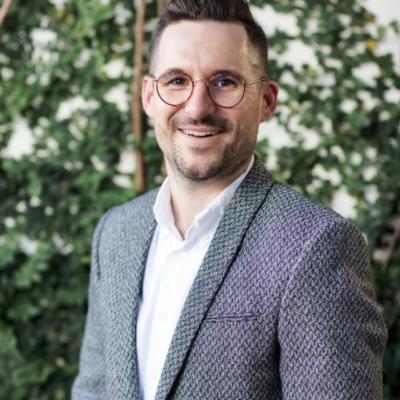The benefits of studying public health at a postgraduate level are manifold. Hear what they are from these 3 UQ Master of Public Health alumni.
Ruchita Rajkumar Bhansali, Chrisny Fernando and Yuxuan Liu are all graduates of postgraduate public health studies. From the best courses to the kind of practical experiences you can get involved in, they uncover what it’s actually like to study public health as a postgrad at UQ, and why you should consider it too.
Which areas of study in public health have you found most engaging?
Ruchita: My fondest memories lie in the Health Promotion series (units 7034, 7035, and 7036), which revealed the potency of evidence-based interventions in transforming a population’s mental health and wellbeing effectively and efficiently.
Chrisny: My favourite course was Managing Global Disease Priorities, as it deepened my love for public health. It also allowed me to understand where I want to journey in my future career.
Yuxuan: Health Systems (PUBH7614) was one of my favourite classes. I completed an assignment analysing Singapore's health system based on 50 articles through literature review. It was challenging but it really stuck with me and helped me gain a deeper understanding of health system construction.
Which public health postgraduate courses and teachers helped you the most throughout your degree?
Ruchita: All my courses played a significant role in my personal and professional growth. This happened either through the continuous feedback loop with every assignment or through reflection, which allowed me to express my appreciation and apply the feedback for improvement.
Chrisny: The most helpful teacher for me was Katherine Cullerton, who went above and beyond every lecture and in her classes to ensure that we had an engaging time.
Yuxuan: I am very grateful to Associate Professor Sheleigh Lawler for teaching me relevant knowledge about health promotion, linking the relevant courses together and helping me secure an internship experience. Associate Professor Lisa Hall and Dr Anna Finnane’s insights into epidemiology, and Dr Louise Marquart-Wilson’s knowledge on biostatistics were also very useful.
Looking for a Master of Public Health Commonwealth Supported Place program?
UQ is providing Commonwealth Supported Places (CSPs) to domestic students for its Master of Public Health in 2025. This means that your tuition fees could be significantly reduced.
What did your average day look like as a postgrad in public health?
Ruchita: An average day typically involved attending scheduled classes, preparing meals, and completing work at the library while enjoying some bubble tea.
Yuxuan: My day was basically spent between reading and writing assessments. Occasionally I would go out and take photos as my hobby.
Did this change between the first and second years of your Master of Public Health?
Ruchita: Things changed quite a bit in the second year as I spent more hours in the library reading articles and reviews, exploring the beautiful Brisbane city libraries and collaborating with my classmates. I also fit in fun things like discovering cafés and culture, and embarking on adventures while finishing assignments.
Yuxuan: There is a big difference between the first and second years. I think it's mainly because I got busier with the addition of the professional placement component.
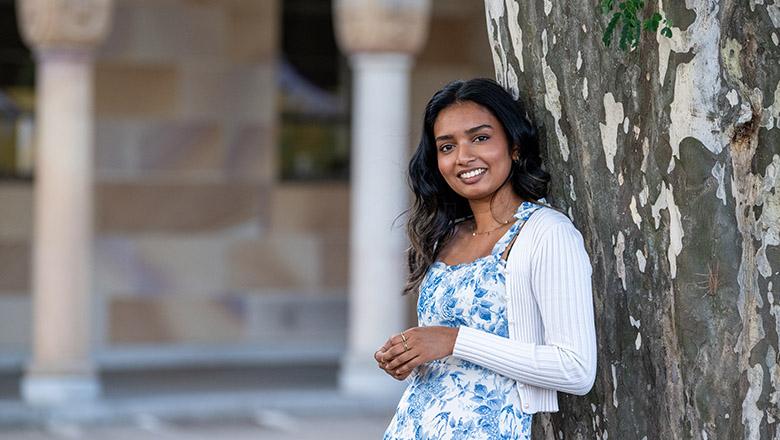
Chrisny first heard of public health when she learnt about infectious diseases in Year 10 geography and has loved everything about it ever since.
What’s the difference between postgrad and undergrad public health studies?
Chrisny: The workload for each course was much higher in comparison to undergraduate degrees, and as a result, I quickly realised I could not complete the same number of casual work hours on the side. I dropped from full-time to part-time study to maintain a balance.
My main advice for postgrad study would be to make sure you allow enough time to self-study. Moreover, don't hesitate to extend your course time if necessary.
Discover how UQ provides flexibility to postgraduate students to help them maintain a healthy work/study/life balance.
What practical experience have you gained during your public health studies?
Ruchita: One of the most fulfilling roles I've had is serving as the postgraduate representative of the UQ Public Health Association (UQ-PHA). I provided support to fellow students and helped them access new opportunities. This included facilitating connections to overcome language barriers and actively participating in the UQ community through events such as the Mentor-Mentee program. These experiences were incredibly rewarding and engaging.
“My placement at Beacon Strategies was a transformative experience as well, providing me with a unique opportunity to bridge the gap between academic learning and practical application.”
I've honed my skills in various aspects of strategic management services, including planning, designing, implementing, and evaluating. Additionally, it has given me a deep understanding of Australian working ethics and helped me discover valuable ways to network for both personal and professional advancement.
Chrisny: I completed a placement at Health and Wellbeing Queensland. It revealed to me much about the workplace and what I needed to expect after graduation.
Yuxuan: I undertook an internship with the National Health and Medical Research Council (NHRMC) Centre of Research Excellence on Achieving the Tabacco Endgame (CREATE). It gave me a lot of new insights into the implementation and formulation of addictive substances policy and also gave me a lot of networking opportunities.
I also worked on UQ’s Student-Staff Partnership Project at the same time as completing my professional placement and attending classes. Juggling the 3 projects together was challenging, but it gave me the courage to do more intense work later on.
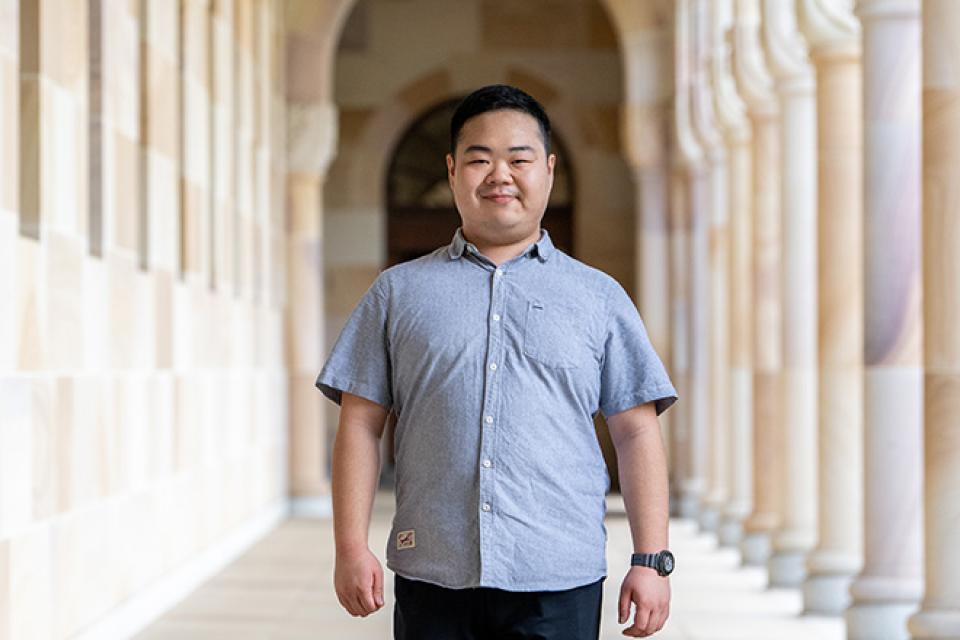
Yuxuan believes that protecting people’s health isn’t just a technical issue. It’s also about popularising health knowledge and promoting the development of health policies.
What can you do with a master’s in public health?
Ruchita: While on placement at Beacon Strategies, I engaged in various activities, including benchmarking, desktop analysis, situational analysis, and other aspects of strategic management services in the field of public health.
Beacon Strategies is a project management and consultancy company working in the public health and social services sectors. Directors Elliot Parkinson and Mitchell Stalker are UQ Master of Public Health graduates.
The company’s aim is to help make specialist projects work, and they’ve engaged in everything from suicide prevention plans in Far North Queensland to community care service design, and regional expansion strategies for leading not-for-profits.
Find out more about the rewarding work you could be doing as a Master of Public Health graduate.
Yuxuan: While working at CREATE, I participated in various activities, including policy summarisation, scientific communication blog writing, desktop research and other public health work in tobacco control. These efforts are expected to play a role in the “smoking-free" next generation.
The NHMRC Centre of Research Excellence on Achieving the Tobacco Endgame brings together a multidisciplinary team of experts to develop the evidence base for tobacco endgame strategies and identify the most promising policies that could end the cigarette epidemic in Australia, and beyond.
Is a master’s in public health worth it?
Ruchita: My postgraduate experience has given me exciting opportunities to pursue my passion for research. I've been able to apply what I've learned in my courses to real-life situations during my placements and connect with others through volunteering, which has been really valuable.
“I am poised for a future brimming with opportunities, including roles such as health promotion officer and policy officer.”
Yuxuan: I believe that the internship experience, research experience and knowledge I gained studying the Master of Public Health has prepared me for a successful career in this field.
Postgraduate study won't just give you new skills and confidence; it can also future-proof your career and increase your earning potential. UQ postgrads earn an average 36% pay rise within 3 years of graduating.*
*Based on median salaries reported by domestic postgraduate coursework graduates employed full time and surveyed between 2022 and 2024 in the Graduate Outcomes Survey by Quality Indicators for Learning and Teaching (QILT).
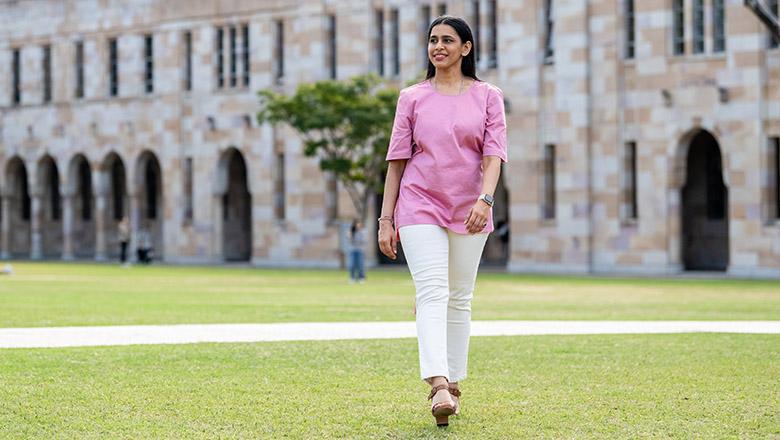
Ruchita believes the key to preparing for postgraduate study is being open to change, particularly when it comes to people, culture and academic style.
What are the benefits of studying public health at UQ?
Ruchita: I chose UQ for my postgraduate degree because of its prestigious ranking, steadfast dedication to academic excellence, mentorship from esteemed professionals, and the chance to flourish within the dynamic UQ community.
Is UQ the best university to study public health at?
Let’s take a look at the facts:
- UQ is #4 in Australia and #25 in the world for public health, according to Shanghai Ranking 2025 Global Ranking of Academic Subjects.
- UQ is #4 in Australia and #37 in the world for life sciences and medicine, according to QS World University Rankings by Subject 2025.
- UQ is #4 in Australia and #57 in the world for medical and health, according to Times Higher Education World University Rankings 2025.
How can you study a postgraduate degree in public health at UQ?
You can study public health at a postgraduate level at UQ in 3 different ways, depending on how much time you want to dedicate to your studies and how in-depth you wish to go into the subject area:
- Graduate Certificate in Public Health (6 months full time)
- Graduate Diploma in Public Health (1 year full time)
- Master of Public Health (2 years full time).
Discover the key differences between a graduate certificate and a diploma, or a graduate diploma and master’s to help inform your decision.
Not sure if you’re prepared to go back to study? Download our guide to getting postgrad-ready in 6 months.

